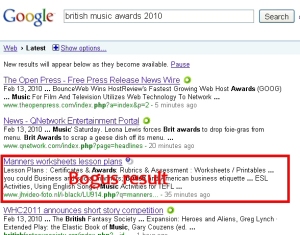 Music fans may already be aware that next Tuesday the British music industry will honor the top acts of the year at a ceremony known simply as The BRITs. What they may not know is that common Internet criminals have begun to target people searching for information about the artists and the music connected with the awards for attack.
Music fans may already be aware that next Tuesday the British music industry will honor the top acts of the year at a ceremony known simply as The BRITs. What they may not know is that common Internet criminals have begun to target people searching for information about the artists and the music connected with the awards for attack.
This will be the 30th ceremony held in the 33 year history of the awards. As in previous years, the BRIT Trust (a charity run by BPI, the UK’s recording industry trade association) will donate profits from the ceremony, including the sale of a three-CD compilation, to various charities that benefit young people in the UK.
Unfortunately, at least two distinct threats face Web surfing Anglo-musicophiles: Bogus music download sites, which tease users with offers of “free downloads” of the compilation set, but then require users to register and pay a fee — none of which ends up in the hands of the BRIT Trust charity; And the purveyors of irritating fake alert messages, which invariably lead to rogue antivirus downloads, are also heavily pushing themselves to near the top rankings in some search results.
The results that led directly into fake virus alerts appeared very near the top of my searches for the BRIT Awards; There’s nearly nothing new about these fake alert messages, which closely resemble those that have been in heavy rotation for the past several months. However, in the example posted above, they do appear to be within the first five search results on Google.
The fake alerts eventually tout the Security Tool rogue, and attempt to induce victims into running the rogue’s installer by going through the motions of a Javascripted “movie” that appears to be an antivirus scan.
The fake scan returns a laundry list of bogus results; A click anywhere on the screen invokes the page to begin a download of the rogue’s installer.
This is the point where, if you’re running Windows, we recommend you hit the Alt-F4 key combination on your keyboard. If you install it, the rogue disables various essential Windows functions, including the Registry Editor and Task Manager, until such time as you pay to “register” the “product.” You don’t need this kind of trouble.
The “free” download sites are another twist, designed to encourage gullible Internet users to part with their money. These Web sites don’t offer legal downloads at all. In fact, they require potential “members” to click through a laughable clickwrap agreement that claims (in a nutshell) to provide access to copyrighted materials, but does not “provide a license to download copyrighted materials.”
Simply searching for “BRIT Awards 2010” led me to a plethora of sites purportedly offering free downloads of the three-CD set, such as this one.
Clicking the links underneath the listing led me to several other Web sites, most of which offer downloads only to “members” who pay a monthly fee — typically less than $5.
All of these Web sites use virtually identical disclaimer language in a dialog box that appears before you’re permitted to download any files.
To use our services legally, you must have the permission of the owener of the copyrights for each file in your possession. (sic)
In most cases, the Web sites make a less than convincing case that the site’s business model is on the up-and-up. Of course, the always-reassuring “As seen on TV” logo that appears on the sites should be taken as a sign that these businesses serve up a quality product that, if you’re lucky, will not get you in legal trouble in your local jurisdiction.
It’s been the experience of many people that these sites simply act as gatekeepers to information you could find elsewhere for free. In fact, within a few minutes I discovered that all one of the sites did is to provide registered users with links where they could find the music downloads on hosting services such as RapidShare.
Webroot recommends that you keep your credit card firmly ensconced in your wallet, and don’t buy what any of these disreputable businesses are selling. Just as with the rogue antivirus products, we urge you to avoid this pitfall, and instead look to businesses that are legally licensed to sell the BRITs CD. After all, the profits all go to charity. Wouldn’t you prefer your entertainment pounds, or dollars, support a worthy cause?


























